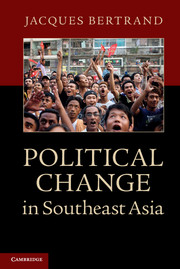Book contents
- Frontmatter
- Contents
- List of figures and tables
- Preface
- 1 Understanding political change in Southeast Asia
- Part I Capitalism, economic growth and political change
- 2 Indonesia and Timor-Leste
- 3 The Philippines
- 4 Malaysia and Singapore
- 5 Thailand
- Part II State-socialist countries and authoritarian stability
- References
- Index
4 - Malaysia and Singapore
Published online by Cambridge University Press: 05 June 2014
- Frontmatter
- Contents
- List of figures and tables
- Preface
- 1 Understanding political change in Southeast Asia
- Part I Capitalism, economic growth and political change
- 2 Indonesia and Timor-Leste
- 3 The Philippines
- 4 Malaysia and Singapore
- 5 Thailand
- Part II State-socialist countries and authoritarian stability
- References
- Index
Summary
Malaysia and Singapore have shared relatively similar paths. Both former British colonies, at independence they formed parliamentary systems along the British model. In each case, a dominant political party gained ascendency at independence and managed to reproduce its power base until today. In Malaysia's case, the dominance of the United Malays National Organization (UMNO) was maintained within coalitions, first the Alliance and next the National Front (Barisan Nasional, BN). Singapore's People's Action Party (PAP) has been more strongly dominant as opposition parties have only recently managed to gain a few seats in parliament and remain very weak. At the same time, both states developed strong, professional bureaucracies and the judicial system has exercised some degree of autonomy and authority. Against the backdrop of this political stability, the middle class has grown remarkably since independence, as both countries have developed rapidly and the proceeds of economic growth have been widely shared. Theories of democratic transition would therefore predict that such high levels of economic development and the large middle class should have made both countries prime candidates for democratization, yet they have maintained soft authoritarian systems. How can we explain such persistence?
Malaysia's post-independence politics have been remarkably stable. Except for ethnic riots that shook the country in 1969, political life has been even, regularized and to some extent devoid of open conflict. No significant regime change occurred and the structure of the political system remained the same, with only few occasional reforms. The state has kept control over simmering ethnic tensions, resentment at persistent inequalities and other forms of discontent through a sophisticated institutional structure that has outlived moments of crisis. The United Malays National Organization (UMNO) remains dominant in a coalition that has ruled Malaysia since independence, although the results of the 2008 elections came close to challenging its position.
- Type
- Chapter
- Information
- Political Change in Southeast Asia , pp. 92 - 120Publisher: Cambridge University PressPrint publication year: 2013



